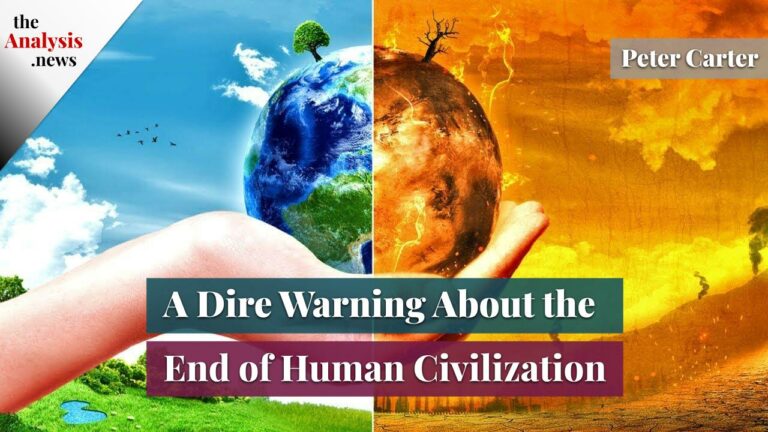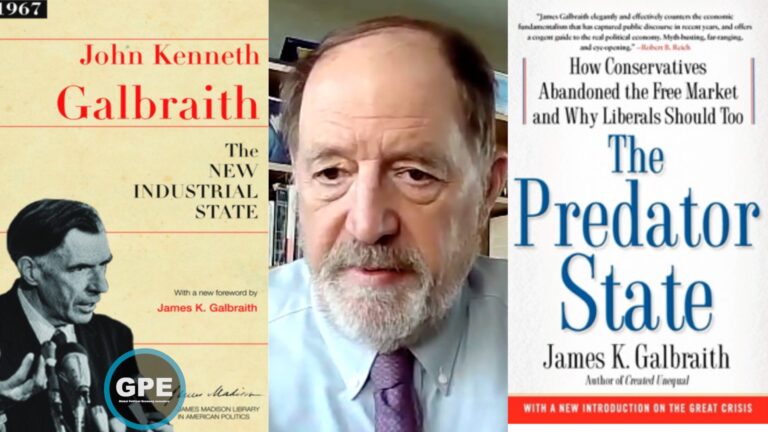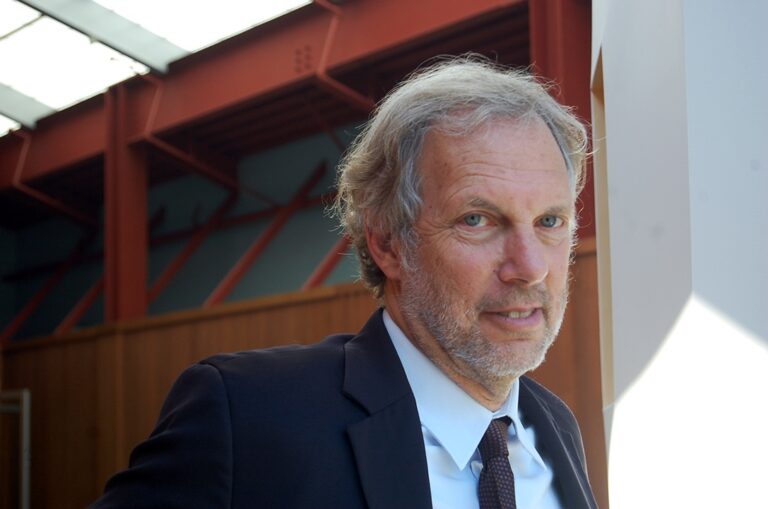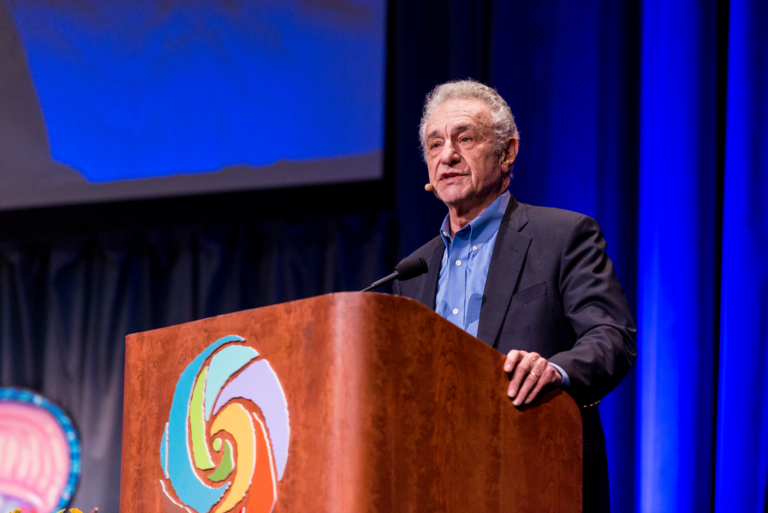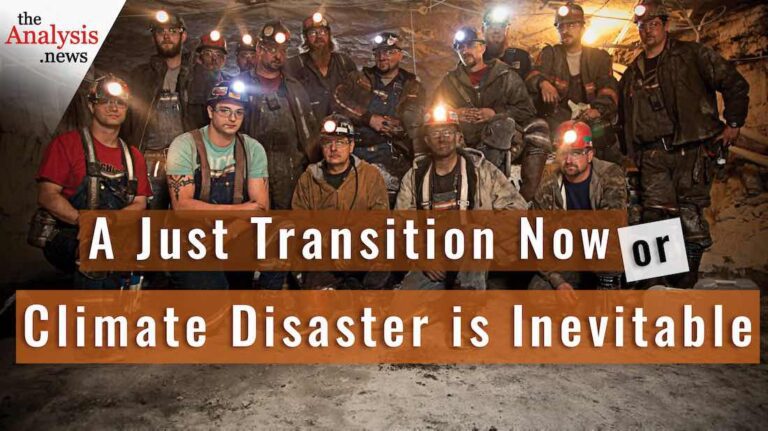This interview was originally published on August 6, 2014. Mr. Williams says capitalism is not capable of facing up to the climate change crisis – and because there won’t be a hero that appears to save the day, it’s up to us to make the change.
PAUL JAY, SENIOR EDITOR, TRNN: Welcome to The Real News Network. I’m Paul Jay, and this is another episode of Reality Asserts Itself.
And the reality asserting itself, probably the biggest one we’re all going to be facing and are facing, is climate change. And while the reality of it is not going to be dependent on whether we recognize it or not, it’s here and it’s coming. But you wouldn’t know that if you looked at today’s politics, both in the United States, countries like Canada, in Europe and around the world. There’s some rhetoric about dealing with climate change, but how much real effective policy is there?
And that begs a bigger question: is it possible within the capitalist system to have an effective confrontation of climate change? Is the kind of changes that are required possible? And if anything’s possible, will it happen in enough time to prevent some of the worst effects of climate change?
Now joining us is Chris Williams. He’s a longtime environmental activist, and author of Ecology and Socialism: Solutions to Capitalist Ecological Crisis. He’s chair of the Science Department at Packer Collegiate Institute and an adjunct professor at Pace University. He reported from Fukushima in December and January 2012 for Truthout. He’s the recipient of the Lannan Cultural Freedom Fellowship for 2013. He reported from the last round of international climate negotiations in Warsaw in November 2013 for Truthout and other outlets. He speaks regularly on TV and radio and such. And he just got back from spending four months in Vietnam, Morocco, and Bolivia analyzing the economic development in the context of climate change.
Thanks for joining us.
CHRISTOPHER WILLIAMS, ENVIRONMENTAL SCIENTIST, ACTIVIST, AND AUTHOR: Thanks for having me on your show.
JAY: And your background is all science. You have a master’s in physics and a master’s in natural sciences.
WILLIAMS: Yep, energy systems and environmental management.
JAY: And you’ve been writing all about this for a long time.
So, as people know, we usually start these Reality Asserts Itself with little bit of personal stuff. I’m going to do that with Chris.
So you told me before that your father–I asked you how you got along politically with your father and whether you grew up in a household where they would approve of what you’re doing, and you said your father worked for Gulf Oil. So where are you guys at?
WILLIAMS: Well, we’re starting to–we tend to agree not to talk about too much politics. Otherwise things get a little out of hand.
JAY: Well, you grew up in that milieu. What brought you to conclusions that were so different than your father?
WILLIAMS: I mean, I think growing up in the 1980s, some things that were really formative on my life was–.
JAY: And this is in Wales, you said?
WILLIAMS: In Wales, and then a little later on in England. Some formative parts of my political life were the antiapartheid struggle, which–I didn’t really understand what was going on on television. But that was the first political organization that I joined, actually, when I was 15, the African National Congress, because the government was in exile in London and you could join, as such, as a teenager–and not that I was allowed to do very much, but it meant that I got a lot more information about what was really happening in South Africa.
JAY: And how did that sit with your folks at home?
WILLIAMS: I don’t think they were so bothered by that. I think I was also interested in nuclear weapons, because that was a huge issue, and nuclear power when I was younger, and those two things, kind of the social justice and environmental justice side of things, coalesced.
JAY: Well, a lot of people grew up in the same period, the same milieu. The same things were happening. And I would–probably most people that grew up in a household that didn’t have that kind of politics, I would guess most people didn’t get active, become activists. Why do you think you did?
WILLIAMS: It’s a good question. I’m not really sure. I do think that I was really motivated by the South African struggle. Kids the same age as me were on the streets trying to fight for justice, and I’d done some reading and understood why I would support black South Africans in their struggle for freedom. Nelson Mandela was, obviously, very inspiring.
And beyond that, I turned up at University when I was 17, and I went by accident on my first protest, which was about getting extra lighting on campus because there’d been attacks on women. And the University said there was no budget for that extra lighting. And so we went and occupied the university meeting, and the next thing we knew they’ve suddenly turned up with a load of money, and within a week they were putting up lighting on campus. So that showed me, in amongst a lot of defeats in the 1980s, that actually protest and demonstrations and things could win. So that was an important part of, I think, thinking about which side did I want to be on and how would I put it into effect.
JAY: A lot of people, certainly most people I knew that got involved as activists, either against the Vietnam War, which is more my era, or some of the issues you’re taking up, a lot of them will go into history. They go into social sciences. You went into hard science. What drew you there?
WILLIAMS: I have always been interested in trying to understand why the universe works the way it does, as opposed to other ways. And so my first degree was in physics, which I did in a Welsh university, ’cause I was really interested in finding out about Welsh culture at the time, being Welsh. And I really enjoyed that aspect of exactly what I was kind of saying, which is just how the universe works in the way that it does, which is connected to environmental questions.
JAY: I grew up in a rural area, and so I was kind of connected to nature and being outside all the time. And so that drew me into a master’s in energy systems and environmental management, ’cause it was kind of the combination of trying to understand energy and how we use it and how that drives so many of the processes, either biological or nonbiological, and then connecting that to kind of an application, which is I like trees and being outdoors. And so how do we manage that kind of situation better with regards to energy extraction and use from a physical science perspective connected to the biological world?
But like a lot of scientists are kind of coming to conclusions now, particularly climate scientists, it’s not just a question of science; it’s also a question of politics and economics. So you can’t really separate that off from the economic and political world at the same time. So that’s kind of where I–.
JAY: When did you get convinced or persuaded that human activity was causing, or was the main contributor, at least, to this climate change issue? Because in the early days of the science, it was still much a debate.
WILLIAMS: Yeah. I mean, I’d read a book in, I think, 1988 or ’89 by a scientist writer in Britain called (about global warning) Hothouse Earth. And that was the same time when James Hansen was first at Congress saying, we’ve got these conclusions; they’re tentative, but it’s looking like we’re altering the climate by our own activities. So it seemed logical to me, coming from an energy perspective, that if you are putting lots of extra energy into the atmosphere and you’ve got this particular molecule, carbon dioxide, which helps absorb and refuses–you know, it doesn’t let out the amount of heat into the atmosphere that it–would have been happening otherwise with lower concentrations, then it’s likely that–it makes sense from a physics perspective that you’re going to be changing the climate. And this has been, actually, a discussion that even goes back into the 1800s. John Tyndall and other scientists–Svante Arrhenius–raised it as a possibility. But, actually, Arrhenius thought it would be a good thing, because Sweden would be warmer.
JAY: It might turn out that way for a while.
WILLIAMS: Yes. Right. And so–.
JAY: And they are saying there’s going to be winners and losers. I mean, Sweden could be, for a while at least,–
WILLIAMS: For sure. Yeah.
JAY: –if you believe no Sweden is an island.
WILLIAMS: Right, depending on where they’re going to get their food from and so on and so forth. But yeah.
So I think it was really a combination of the scientific perspective that I had, connected to the kind of the politics that I was out doing on the streets in London at the time.
JAY: And as you’re going through the process of deciding whether you believe–and at the point now, they’re saying 95 percent or more sure of this–it was a process of, for a lot of scientists, getting to that point. Were there arguments that come from what are called climate deniers or climate skeptics, were there certain arguments that you had to work through yourself and look into to kind of decide, I think this science is sound?
WILLIAMS: I think that there was a lot of debate initially how many parts per million of carbon dioxide in the atmosphere above the industrial-/preindustrial-era 280 was significant enough to be really changing climate. Initially it was thought to be maybe 450. Lord Stern said maybe 550 we need to stop. Now it’s many scientists, Hansen included, would say 350, and we’re at 400 at the moment.
JAY: Break that down a bit, what we’re talking about, that 350 number.
WILLIAMS: Yeah. So for the whole of human civilization, the last 10,000 years and longer, then the Earth has had an average amount of carbon in the atmosphere of about 280 molecules of carbon dioxide per million molecules of air, as it were. So that’s been steadily increasing. And there are lots of graphs to show how that has been happening, to the extent that we’re now at 400 parts per million.
And if we want to stay within 2 degrees Celsius of average warming from 150 years ago to today–and we’ve already seen about 1 degree so far–then we need to get back down to 350. And if you burn things with carbon in them, they inevitably turn into carbon dioxide. So every type of fossil fuel that we burn, which is responsible for the vast majority of energy, electricity, transportation, etc., is putting extra carbon into the atmosphere.
And that particular molecule happens to have this other characteristic, that it will allow heat from the sun in and energy, light, etc., but when it reflects outwards as infrared radiation, it blocks a higher percentage, hence kind of the greenhouse type analogy that has been used to make the connection to how a greenhouse works, essentially by trapping extra heat. So, obviously, the atmosphere has to stay at an average temperature, and as much energy and [heat] as comes in has to really leave at the same time. And now we’re finding less energy is leaving than is coming in. And that’s why the overall average temperature is warming. It’s going to be 2 degrees in some places. In other places, like the Arctic, it could be up to 6 or 8 degrees Celsius, which would be absolutely disastrous. And so we’re on track not just for 2 degrees Celsius, but actually, according to the World Bank, 4 Celsius.
JAY: By the end of the century.
WILLIAMS: By towards the end of the century, yes. And so we’re already seeing a number of different ways in which the climate is being destabilized [crosstalk]
JAY: So we’re talking within the lifetime of our children.
WILLIAMS: Absolutely. Within the lifetime of many people, 80 percent of the population alive today, we’ll see significant changes to the way in which their region behaves with regard to rainfall patterns, with regard to how many hot days there are, how many days above 90 Fahrenheit, how many days above 100 Fahrenheit, which has all kinds of other knock-on effects in terms of air conditioning, in terms of also what we saw this winter in the Midwest with the polar vortex and the destabilization of the jet streams, which is being linked to climate change. So there are an intensification of hurricanes. If you’ve got more heat in the atmosphere, then the logical corollary of that is more energy, right? And that’s what it takes, one of the things that it takes to [build big hurricanes. (?)]
JAY: I’ve always imagined if there is this enormous meteor headed towards Earth and when it hit it would blow the earth to pieces, but the first time they see it, it’s a million years out, so who cares? And then 500 and this and that. But there’s a point somewhere where the meteor is close enough–is it 50 years out or 30 years or whatever–where people say, oh-oh, that’s close enough that this is going to drop on my head.
Well, it seems to me that in terms of the science with climate change, we’re close enough now, if you’re saying the majority of people are going to feel the effects–and certainly our children are going to feel the effects in great, serious ways–where is the reaction? Where is the response? I mean, how many years of the Obama presidency did it take before he finally has a regulation where he starts to approach at least saying they’re going to do something about it? One can debate how effective it is, but it’s been well into his presidency before he even gets serious about even mentioning the words. And if anything, Europe’s pulling back from some of the measures they were doing. Again, you can debate how effective they were, but it seemed to be more top-of-mind in Europe. Even that, I mean, part of the economic crisis has done something. Before we get into kind of more of the substance of the economic elite in all of this, why do you think there isn’t more of a mass response that you’re putting us all in danger?
WILLIAMS: A mass response from ordinary people?
JAY: Yeah.
WILLIAMS: I mean, I think that–I don’t know whether people are waiting for Bruce Willis or not, but he’s not going to turn up. And so it really is down to us to make a change. And I think it’s a combination, actually, both from the people at the top and from the majority of the population, that we’ve had 30 years of neoliberal economics which have pushed back civil rights and many of the rights that were won in the 1960s and 1970s in the last round of huge social upheaval. And to be honest, I think we’ve lost ground in lots of different ways on social and political questions. And so we haven’t got a lot of confidence. I think the collapse of the Soviet Union–I didn’t believe it was socialism or communism or anything, but that had led to a level of triumphalism around capitalism that compounded some of the defeats on the ground and left people with little hope that there was some kind of alternative.
JAY: Is part of the issue that, if you take my analogy that this meter is coming, there is a faith that there’s a point at which even the elites are going to get blown up by this meteor, so there’s a point where they’ve got to get their atomic weapons or–if it is Bruce Willis, and send him out there and put charges and blow the thing up, there’s a feeling that if it really was that serious, the system has to respond to it for the sake of the system? But your thesis is that’s actually not what’s happening, that this is a threat, even to the capitalist system, but because of how the capitalist system works, it actually really can’t respond to it. Is that what you’re saying?
WILLIAMS: I don’t think that there’s a complete solution or answer under capitalism. And it is, even for me, kind of rather shocking that actually so little effort has been put into–by the people who commission all of the reports. I mean, Obama is very far from stupid, and he reads the–he commissions the reports, and I’m sure he reads them or his aides read them to him. And so he knows what’s going on, as do many of the other world leaders.
JAY: And they have for years.
WILLIAMS: And they have for years. The World Bank, the IMF, all of the [crosstalk]
JAY: [crosstalk] Stern report that was done for Tony Blair that–.
WILLIAMS: Two thousand six. Yep.
JAY: This goes back a ways.
WILLIAMS: Yep. So they are receiving the same scientific reports that I’m reading. And yet it’s still full steam ahead with an expansion of fossil fuel production, an expansion of the economy in general, more funding for coal plants around the world, and very little being done. The European Union has done a few things. But, like you’re saying, their latest report is calling for something–I’m quoting–sustainable fossil fuel use. So I don’t know what that term means, particularly in the context of climate change.
JAY: Okay. Well, you wrote a piece called “Wall Street to Planet Earth: We Don’t Mind and You Don’t Matter”. In the next segment, we’re going to work our way through the article, ’cause I think it’s a good elaboration of your basic thesis, which at least capitalism as we know it is not providing and isn’t going to provide solutions to this.
So please join us for the next segment of Reality Asserts Itself as we explore the climate change crisis and what to do about it.
Never miss another story
Subscribe to theAnalysis.news – Newsletter
“Chris Williams is a longtime environmental activist and author of Ecology and Socialism: Solutions to Capitalist Ecological Crisis. He is a professor of physics and chemistry at Pace University and chair of the science department at Packer Collegiate Institute, and a regular contributor to the International Socialist Review.”






